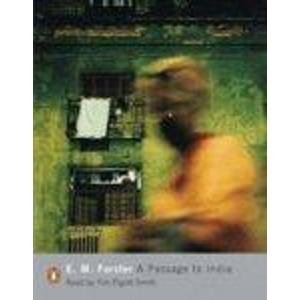A Passage to India (Audiobook)

"synopsis" may belong to another edition of this title.
Written while England was still firmly in control of India, Forster's novel follows the fortunes of three English newcomers to India--Miss Adela Quested, Mrs Moore and Cyril Fielding--and the Indian, Dr Aziz, with whom they cross destinies. The idea of true friendship between the races was a radical one in Forster's time, and he makes it abundantly clear that it was not one that either side welcomed.
Despite their countrymen's disapproval, Miss Quested, Mrs Moore and Mr Fielding are all eager to meet Indians, and in Dr Aziz they find a perfect companion: educated, westernized, and open- minded. Slowly, the friendships ripen, especially between Aziz and Fielding. Having created the possibility of esteem based on trust and mutual affection, Forster then subjects it to the crucible of racial hatred: during a visit to the famed Marabar caves, Miss Quested accuses Dr Aziz of sexually assaulting her, but then later recants during the frenzied trial that follows. Under such circumstances, affection proves to be a very fragile commodity indeed.
Arguably Forster's greatest novel, A Passage to India paints a troubling portrait of colonialism at its worst, and is remarkable for the complexity of its characters. Here the personal becomes the political, and in the breach between Aziz and his English "friends", Forster foreshadows the eventual end of the Raj. --Alix Wilber
A Passage to India is set in the rural landscape during a time of British occupation. This is a (not necessarily damning) examination and critique of colonialism and offers a very wide view of the issues it raises. There are no heroics here. Aziz is the downtrodden 'native' character, apallingly abused, to whom my sympathies attached, and yet the hatred that surrounds him turns him to hatred and propels down a vengeful path towards a kind of destruction. Only his long-standing friendship with Mr. Fielding can save him, but Mr. Fielding is English, and Aziz must reconcile himself with this and conquer his own hatred. --By Dan Crawford on 2 Aug. 2012
The language of this work is by far the best I've come across. Amazing! E M Forster is undoubtedly one of the most eloquent writers. The character build-up is slow, steady and realistic. Gives a very close picture of the Indian society that existed during the British Raj and remnants of which can still be found in us Indians - not only our buildings, out attitude, our tastes and our demeanor in general --Saad Hashmi Dec 30, 2014
"About this title" may belong to another edition of this title.
- PublisherPenguin Classics
- Publication date2000
- ISBN 10 0141801972
- ISBN 13 9780141801971
- BindingAudio Cassette
- Rating
(No Available Copies)
Search Books: Create a WantIf you know the book but cannot find it on AbeBooks, we can automatically search for it on your behalf as new inventory is added. If it is added to AbeBooks by one of our member booksellers, we will notify you!
Create a Want
